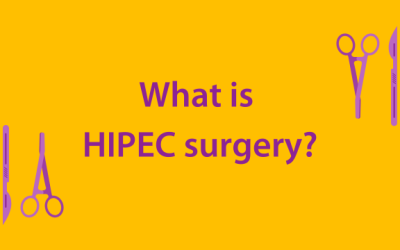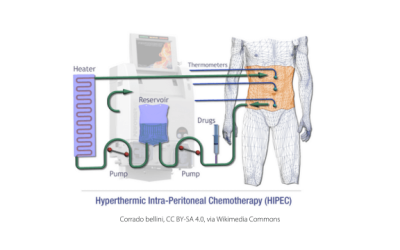The most important prognostic factor for pseudomyxoma peritonei (PMP) is the completeness of cytoreduction or the ability to remove all visible tumour nodules during the cytoreductive surgery.
The completeness of cytoreduction (CCR) was assessed using the CCR Score. Index that quantifies the extent of residual disease at the end of the procedure is classified into 4 categories:
- CCR0 (no macroscopic residual disease)
- CCR1 (residual tumours less than 2.5 mm)
- CCR2 (residual tumours between 2.5 mm and 2.5 cm)
- CCR3 (residual tumours greater than 2.5 cm)
| CC0 | No disease | |
| CC1 | present -> 0.25cm | |
| CC2 | 0.25cm -> 2.5cm |  |
| CC3 | >2.5cm |  |
Studies have shown that patients with a complete cytoreduction (CCR-0 or CCR-1) have better long-term survival rates compared to those with incomplete cytoreduction (CCR-2 or CCR-3).
The histologic grade and subtype of the tumour, along with the patient’s age and general state of health, are additional prognostic markers. The most important element in determining the long-term prognosis of PMP patients, however, continues to be the completeness of cytoreduction.
More FAQs
What is HIPEC surgery?
HIPEC is a cancer treatment that involves surgery and heated chemotherapy. It’s used for advanced abdominal cancers like pseudomyxoma peritonei.
What are the benefits of HIPEC?
HIPEC stands for “Hyperthermic Intraperitoneal Chemotherapy” and follows cytoreductive surgery (CRS).
What is adenocarcinoma ex-goblet cell?
Adenocarcinoma Ex-Goblet Cell of the appendix is a type of cancer that originates from the cells that line the inside of the appendix.
References
Cytoreductive surgery and intraperitoneal chemotherapy for peritoneal carcinomatosis...
Jo MH, Suh JW, Yun JS, Namgung H, Park D-G. Cytoreductive surgery and intraperitoneal chemotherapy for peritoneal carcinomatosis of colorectal cancer: 2-year follow-up results at a single institution in Korea. Annals of Surgical Treatment and Research. 2016;91(4):157. doi:10.4174/astr.2016.91.4.157
Consensuses and controversies on Pseudomyxoma Peritonei:...
Lin Y-L, Xu D-Z, Li X-B, et al. Consensuses and controversies on Pseudomyxoma Peritonei: A review of the published consensus statements and Guidelines. Orphanet Journal of Rare Diseases. 2021;16(1). doi:10.1186/s13023-021-01723-6
Written by: the Pseudomyxoma Survivor editorial team



